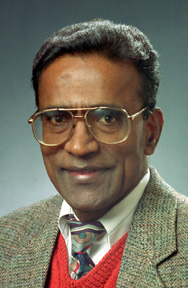ISU receives $842,000 from DOD to develop ‘smart’ prosthetic hand
September 20, 2007
Engineers, a biomedical researcher and a physical and occupational therapist at Idaho State University are collaborating to develop a “smart” prosthetic hand that will use nerve signals to fully simulate natural grasping, lifting and twisting hand motions. They hope the artificial hand will also respond to sensory and visual feedback.
The United States Army Medical Research and Material Command (USAMRMC) of the Department of Defense (DoD) funded the first phase of this three-phase project this summer, providing an $842,000 grant to ISU for the proposal titled “Smart Prosthetic Hand Technology Phase I” under the project “Combat Casualty Research Program, Telemedicine and Advanced Technology Program – Biotechnology.”
 “The existing commercial technology for arm and hand amputees hasn’t changed significantly in the past six decades,” said Subbaram Naidu, Ph.D., ISU professor of Electrical Engineering. He is the grant’s principal investigator (PI). “The Department of Defense is embarking on a research program to fund prosthetic research to revolutionize upper-body prosthetics and to develop artificial arms that will feel, look and perform like a real human arm guided by the central nervous system. We are taking a unique approach to helping achieve these goals.”
“The existing commercial technology for arm and hand amputees hasn’t changed significantly in the past six decades,” said Subbaram Naidu, Ph.D., ISU professor of Electrical Engineering. He is the grant’s principal investigator (PI). “The Department of Defense is embarking on a research program to fund prosthetic research to revolutionize upper-body prosthetics and to develop artificial arms that will feel, look and perform like a real human arm guided by the central nervous system. We are taking a unique approach to helping achieve these goals.”
The ISU program features a collaboration of researchers from the College of Engineering. They include Naidu, an electrical engineer; mechanical engineers Alba Perez, Ph.D., and Marco Schoen, Ph.D.; and civil/environmental engineer Solomon Leung, Ph.D. They’re working with James Lai, Ph.D., in the College of Pharmacy, with input from Alex Urfer, Ph.D., chair of the physical and occupational program in the ISU Kasiska College of Health Professions. The first phase of the project, theoretical development, is scheduled to take 18 months followed by the building and testing phases of the project. 
On the engineering side of the project, much of the work will be completed in the ISU Measurement and Control Engineering Research Center (MCERC) located in the ISU Engineering Research Complex at 1030 South Second Avenue in Pocatello. Most of the biomedical research will be done in the ISU College of Pharmacy research laboratories.
In brief, ISU researchers will use skin sensors for “electromyographic” (EMG) signal extraction – recording the electrical activity in skeletal muscle. The scientists will then try to determine which EMG signals correspond to intended hand motions. Next, they will try to develop an “intelligent” control for prosthetics using a variety of sophisticated computing techniques, including practices such as utilizing “neural networks, fuzzy logic, genetic algorithms and evolutionary computing.” After developing a robotic hand, the group will test its sensing and transmission systems. The researchers will test the biocompatibility of the hand and its ability to transfer signals. On this latter topic, current prosthetics are made of materials that can cause inflammatory reactions to the limb they are attached to. ISU researchers will explore how to create artificial hands and implants that can be made of materials that will cause fewer inflammatory reactions that plague current prosthetics.
“We will examine how to bypass the tissue rejection problem that has occurred when trying to attach a prosthetic device,” Lai said. “We’ll use this study as a potential springboard to other possible research in tissue engineering and the creation of artificial organs.”
This study is being funded by the Department of Defense in an effort to rehabilitate military personnel – current high causality rates in the battle field with a higher percentage of survival has produced a larger number of veterans with hand amputations. However, the proposed work can also be used for people in civil life who have lost their limbs due to accidents or birth defects. Further, this research will be applicable to other areas of interest such as aerospace, naval, biomedical and automotive industries.
Categories:
